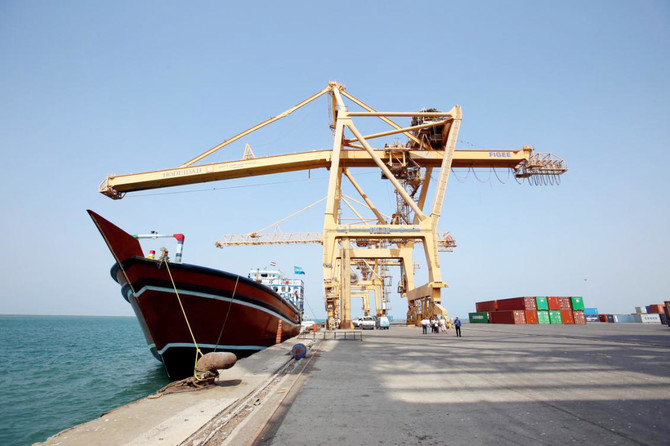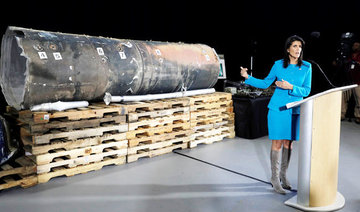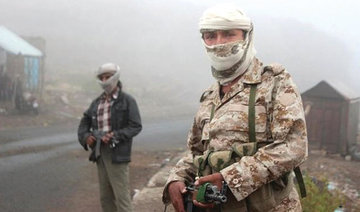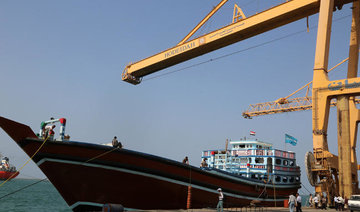JEDDAH: The Saudi-led Arab Coalition in Yemen will keep the Houthi-controlled Hodeidah port open for a month despite a missile attack on Riyadh that was intercepted on Tuesday.
The coalition said on Wednesday it was “keen to maintain humanitarian aid to the brotherly Yemeni people.” Two days after a missile fired at Riyadh was intercepted on Nov. 4, Saudi Arabia and its allies closed air, land and sea access to Yemen to prevent the flow of arms from Iran to the Houthis.
The Iran-backed militia must surrender their weapons before the start of any peace talks, Yemen’s President Abed Rabbo Mansour Hadi said on Tuesday night. Other conditions are the restoration of his government to power and the handover of state institutions.
“We do not have a partner with whom we can reach peace,” Hadi said at a meeting with foreign ambassadors at his residence in Riyadh.
Dialogue had become impossible since the Houthis assassinated Yemen’s former President Ali Abdullah Saleh, who had sought a cease-fire deal with Saudi Arabia, Hadi said. “They have proved that they do not tend toward peace... and any attempt at peace before their weapons are seized is a waste of time.”
Tuesday’s Houthi attack on Al-Yamamah Palace in Riyadh sparked global outrage. Iran has also been criticized for its support of the militia to foment unrest in Yemen. The US ambassador to the UN, Nikki Haley, urged the Security Council on Tuesday to punish Iran for its “dangerous violations” of UN resolutions and “destabilizing behavior.”
Tuesday’s missile attack “bears all the hallmarks of previous attacks using Iranian-provided weapons,” Haley said.
“This is not the first time the Houthis have fired missiles at civilians in a G-20 country. And unless we act, it won’t be the last. It is only a matter of time before one of these missiles hits the target. If we don’t do something, we will miss the opportunity to prevent further violence from Iran.”
Haley said a new report from the UN Secretary-General Antonio Guterres — the fourth such report on the progress of Iran’s compliance with Resolution 2231 — was “the most damning yet” and urged the council to consider “a few options we can use to put pressure on Iran to adjust their behavior.”
The resolution endorses the 2015 nuclear deal with Iran, but also imposes restrictions on Tehran’s use and export of ballistic missiles. The report was compiled before the latest missile attacks on Saudi Arabia, but Haley said it still contained evidence of Iranian involvement in illegal activities.
“The report describes a dual English-Farsi keyboard that was part of the guidance system of an unmanned surface vehicle used against the Saudi coalition in Yemen. That was just one of several pieces of evidence that points to the Iranian manufacture of the detonation and guidance systems of the weapon,” she said. “There is plenty more.”
She also referred to the recovery of a number of weapons “from attacks and planned attacks on a G-20 country” which were “made by Iranian weapons industries tied to the Iranian Revolutionary Guards Corps (IRGC).”
“We must speak with one voice in dealing with Iranian threats to peace,” Haley said. “While we do so, we must also make it clear that the Iranian people are not the problem. The Iranian people are victims of their own government.”
Haley also recognized that many UN member states had “put a lot of effort into the nuclear agreement with Iran.” However, she said: “That should not allow us to look the other way at the very serious non-nuclear items like sales of arms, ballistic missile testing, and support for terrorism.
“The international community must demonstrate that we are committed to ensuring accountability for the full spectrum of Iran’s malign behavior.”
Vital Yemen port to stay open for a month
Vital Yemen port to stay open for a month

UN chief urges release of staff held by Yemen’s Houthi rebels

- “The United Nations will continue to work through all possible channels to secure the safe and immediate release of those arbitrarily detained,” the secretary-general said
UNITED NATIONS, United States: UN chief Antonio Guterres called Friday for the “immediate and unconditional” release of all humanitarian staff held by Yemen’s Houthis, saying the rebel group had detained seven United Nations workers.
The Iran-backed Houthis have held dozens of workers from the United Nations and other aid groups since the middle of last year, including 13 UN staff since last June.
“Their continued arbitrary detention is unacceptable,” Guterres said in a statement, adding that the “continued targeting of UN personnel and its partners negatively impacts our ability to assist millions of people in need in Yemen.”
“The United Nations will continue to work through all possible channels to secure the safe and immediate release of those arbitrarily detained,” the secretary-general said.
Reeling from a decade of war, Yemen is mired in a humanitarian catastrophe with more than 18 million people needing assistance and protection, according to the United Nations.
The latest detentions of UN staff come after United States President Donald Trump ordered the Houthis placed back on the US list of foreign terrorist organizations.
Re-listing the Houthis will trigger a review of UN agencies and other NGOs working in Yemen that receive US funding, according to the executive order signed on Wednesday.
Large drop in number of aid trucks entering Gaza on Friday

- The influx of aid this week compares with just 2,892 aid trucks entering Gaza for the whole of December, according to data from the UN Palestinian relief agency UNRWA
UNITED NATIONS: More than 4,200 aid trucks have entered the Gaza Strip in the six days since a ceasefire began between Israel and Palestinian militants Hamas, the United Nations said, although there was a large drop in the number of loads delivered on Friday.
The UN Office for the Coordination of Humanitarian Affairs (OCHA) said 339 aid trucks crossed into Gaza on Friday, citing information from Israeli authorities and the guarantors for the ceasefire agreement — the United States, Egypt and Qatar.
This compares with 630 on Sunday, 915 on Monday, 897 on Tuesday, 808 on Wednesday, and 653 on Thursday.
The truce deal requires at least 600 truckloads of aid to enter Gaza each day of the initial six-week ceasefire, including 50 carrying fuel. Half of those trucks are supposed to go to Gaza’s north, where experts have warned famine is imminent.
When asked why there was a large drop in the number of aid trucks on Friday, OCHA spokesperson Eri Kaneko said the UN and humanitarian partners “have been working as quickly as possible to dispatch and distribute this large volume of assistance” to some 2.1 million people across the devastated enclave.
The influx of aid this week compares with just 2,892 aid trucks entering Gaza for the whole of December, according to data from the UN Palestinian relief agency UNRWA.
Aid is dropped off on the Gaza side of the border, where it is picked up by the UN and distributed. Data from OCHA shows 2,230 aid truckloads — an average of 72 a day — were then picked up in December.
Throughout the 15-month war, the UN has described its humanitarian operation as opportunistic — facing problems with Israel’s military operation, access restrictions by Israel, and more recently looting by armed gangs.
The UN has said that there has been no apparent major law-and-order issues since the ceasefire came into effect.
“We are also scaling up the broader response, including by providing protection assistance, education activities and other essential support,” Kaneko said.
Gaza aid surge having an impact but challenges remain

- In the final months before the ceasefire, the few aid convoys that managed to reach central and northern Gaza were routinely looted
- Over the past week, UN officials have reported "minor incidents of looting"
JERUSALEM: Hundreds of truckloads of aid have entered Gaza since the Israel-Hamas ceasefire began last weekend, but its distribution inside the devastated territory remains an enormous challenge.
The destruction of the infrastructure that previously processed deliveries and the collapse of the structures that used to maintain law and order make the safe delivery of aid to the territory's 2.4 million people a logistical and security nightmare.
In the final months before the ceasefire, the few aid convoys that managed to reach central and northern Gaza were routinely looted, either by desperate civilians or by criminal gangs.
Over the past week, UN officials have reported "minor incidents of looting" but they say they are hopeful that these will cease once the aid surge has worked its way through.
In Rafah, in the far south of Gaza, an AFP cameraman filmed two aid trucks passing down a dirt road lined with bombed out buildings.
At the first sight of the dust cloud kicked up by the convoy, residents began running after it.
Some jumped onto the truck's rear platforms and cut through the packaging to reach the food parcels inside.
UN humanitarian coordinator for the Middle East Muhannad Hadi said: "It's not organised crime. Some kids jump on some trucks trying to take food baskets.
"Hopefully, within a few days, this will all disappear, once the people of Gaza realise that we will have aid enough for everybody."
central Gaza, residents said the aid surge was beginning to have an effect.
"Prices are affordable now," said Hani Abu al-Qambaz, a shopkeeper in Deir el-Balah. For 10 shekels ($2.80), "I can buy a bag of food for my son and I'm happy."
The Gaza spokesperson of the Fatah movement of Palestinian president Mahmud Abbas said that while the humanitarian situation remained "alarming", some food items had become available again.
The needs are enormous, though, particularly in the north, and it may take longer for the aid surge to have an impact in all parts of the territory.
In the hunger-stricken makeshift shelters set up in former schools, bombed-out houses and cemeteries, hundreds of thousands lack even plastic sheeting to protect themselves from winter rains and biting winds, aid workers say.
In northern Gaza, where Israel kept up a major operation right up to the eve of the ceasefire, tens of thousands had had no access to deliveries of food or drinking water for weeks before the ceasefire.
With Hamas's leadership largely eliminated by Israel during the war, Gaza also lacks any political authority for aid agencies to work with.
In recent days, Hamas fighters have begun to resurface on Gaza's streets. But the authority of the Islamist group which ruled the territory for nearly two decades has been severely dented, and no alternative administration is waiting in the wings.
That problem is likely to get worse over the coming week, as Israeli legislation targeting the lead UN aid agency in Gaza takes effect.
Despite repeated pleas from the international community for a rethink, the UN Relief and Works Agency for Palestine Refugees (UNRWA), which has been coordinating aid deliveries into Gaza for decades, will be effectively barred from operating from Tuesday.
UNRWA spokesman Jonathan Fowler warned the effect would be "catastrophic" as other UN agencies lacked the staff and experience on the ground to replace it.
British Foreign Secretary David Lammy warned last week that the Israeli legislation risked undermining the fledgling ceasefire.
Brussels-based think tank the International Crisis Group said the Israeli legislation amounted to "robbing Gaza's residents of their most capable aid provider, with no clear alternative".
Israel claims that a dozen UNRWA employees were involved in the October 2023 attack by Hamas gunmen, which started the Gaza war.
A series of probes, including one led by France's former foreign minister Catherine Colonna, found some "neutrality related issues" at UNRWA but stressed Israel had not provided evidence for its chief allegations.
Israel UN envoy formally calls on UNRWA to vacate Jerusalem premises

- Israel UN envoy formally calls on UNRWA to vacate Jerusalem premises
- UNRWA chief Philippe Lazzarini warns against ‘blatant disregard of international humanitarian law’
NEW YORK: Israel’s Permanent Representative to the UN Danny Danon on Friday called on the UN relief agency for Palestine refugees to halt its operations in Jerusalem, and evacuate its premises in the city “no later than Jan. 30,” the day an Israeli ban on the organization is due to take effect.
Legislation blocking UNRWA from operating within Israel was approved overwhelmingly by the Knesset in October. The ban also prevents the country’s authorities from maintaining any contact with the relief agency.
Delivery of aid to Gaza and the West Bank requires close coordination between UNRWA and Israeli authorities. If the legislation is implemented as planned, Israel will no longer issue agency staff with work or entry permits, and coordination with the Israeli military that is essential for ensuring safe passage for aid deliveries will no longer be possible.
Since the start of the war in Gaza, Israel has relentlessly condemned and attacked the aid agency. More than 260 of its staff have been killed, while its schools — used by displaced Palestinians for shelter — have been bombed. A coordinated Israeli media campaign has attempted to discredit the agency by portraying it as a tool of Hamas.
As the date for enforcement of the Israeli ban approaches, Danon told UN Secretary-General Antonio Guterres that UNRWA’s premises in Jerusalem must be vacated as stipulated by law.
The Israeli envoy said that the legislation came “as a direct response to the acute national security risks posed by the widespread infiltration of UNRWA’s ranks by Hamas and other terrorist organizations, and the agency’s persistent refusal to address the very grave and material concerns raised by Israel, and to remedy this intolerable situation.”
He added: “Months of good-faith engagement with the United Nations, and years of related grievances conveyed to UNRWA, have been met with blatant disregard, compromising its fundamental obligation to impartiality and neutrality beyond repair.”
Most UN member states consider UNRWA, the largest aid agency for Palestinians, to be the irreplaceable backbone of humanitarian operations. However, few levers have been pulled to try to ensure the agency’s existence.
Asked by Arab News about this discrepancy between public statements of support and meaningful action, and whether it means Western countries are undermining the same multilateral values on which they were founded, UNRWA Commissioner-General Philippe Lazzarini said: “The same question could be asked about the importance of international humanitarian law and the blatant and constant disregard of that law.
“You can ask the same question about the disrespect for the resolutions of the Security Council and the General Assembly. And you can ask the same question about the International Court of Justice’s ruling that Israel’s presence in the West Bank and East Jerusalem is illegal, and the court’s call for its withdrawal.
“And so, it’s obviously frustrating,” Lazzarini added. “What we have witnessed is an extraordinary ‘crisis of impunity,’ to the extent that international humanitarian law is almost becoming irrelevant if no mechanism is put in place to address this impunity.”
Hamas buries 2 leaders slain in Israel strike in Gaza months ago

- Hundreds of people attended the funerals of Rauhi Mushtaha and Sami Mohammad Odeh during Friday prayers
- The bodies, draped in the green flag of Hamas, were carried on stretchers from the mosque
GAZA CITY: Two senior Hamas members, whom Israel said it had killed months ago, were buried in Gaza on Friday after their remains were discovered under rubble during the truce, AFP journalists reported.
Hundreds of people attended the funerals of Rauhi Mushtaha and Sami Mohammad Odeh during Friday prayers in the courtyard of the Omari mosque, a historic landmark in the heart of Gaza City that has been heavily damaged by Israeli bombing.
The bodies, draped in the green flag of Hamas, were carried on stretchers from the mosque to their burial site, accompanied by around 16 masked members of the Ezzedine Al-Qassam Brigades, the armed wing of the Palestinian Islamist group.
The Israeli army announced in early October that it had “eliminated” Mushtaha and Odeh along with another Hamas leader “about three months earlier” during an air strike in the Gaza Strip.
Mushtaha, designated an “international terrorist” by the United States in 2015, was a member of Hamas’s political bureau in Gaza, responsible for finances.
Odeh was the head of Hamas’s internal security agency.
Hamas officially acknowledged their deaths in a statement on Sunday, saying that they had fallen as “martyrs.”






















